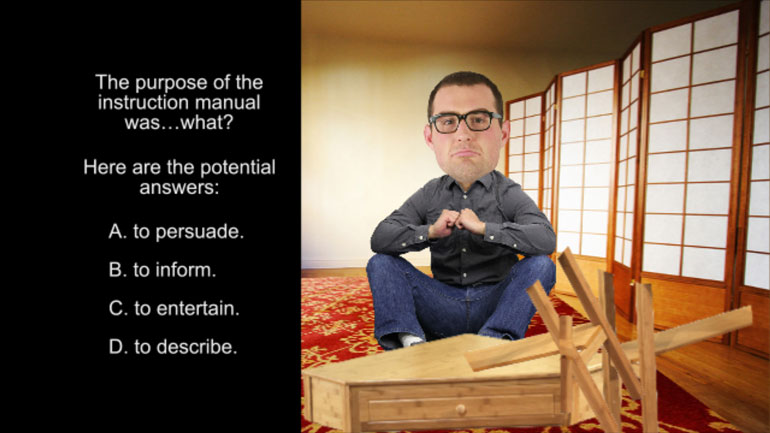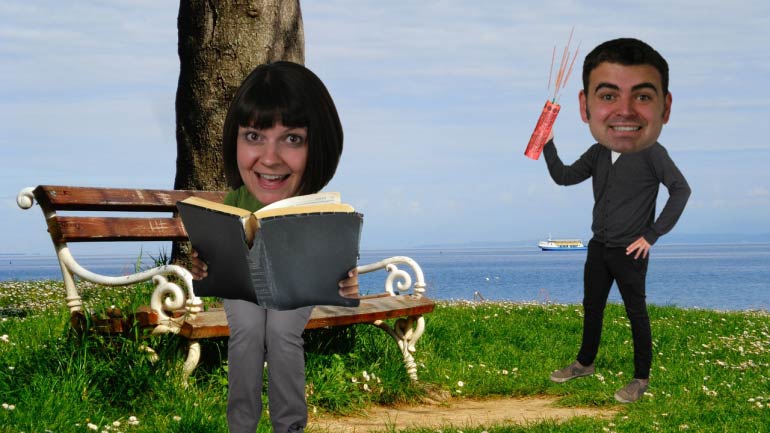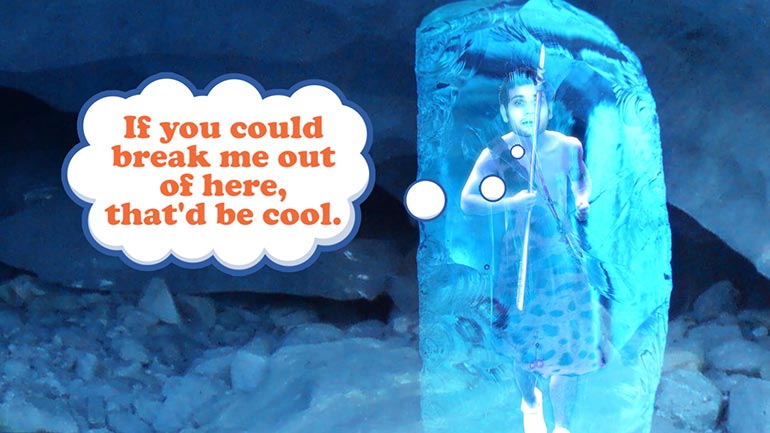ShmoopTube
Where Monty Python meets your 10th grade teacher.
Search Thousands of Shmoop Videos
ELA 3: Migrations 24 Views
Share It!
Description:
Back in the day you used to be able to walk right over to North America from Russia. Times sure have changed.
Transcript
- 00:00
[Coop and Dino singing]
- 00:08
America contains lots of different people from lots of different places. [The statue of liberty]
- 00:12
But they didn't all arrive in America at the exact same time on some big party boat, as
- 00:16
fun as that would have been. [People dancing on a party boat]
- 00:17
So how did people get to America?
Full Transcript
- 00:20
Well, the first arrivals showed up somewhere between 16,500 and 13,000 years ago, across
- 00:26
a land bridge that connected Russia and Alaska.
- 00:29
At the time, people hunted huge, elephant-like beasts called mastodons, and one day, they [Caveman hunting a mastodon]
- 00:34
ended up chasing them across the land bridge, right into present day North America.
- 00:38
In the Americas, these hunters found clean water and lots of great food, so they decided [Hunter finds bottles of water and deer holding a pizza]
- 00:42
to stick around, becoming the ancestors of the First People.
- 00:45
Over thousands of years, they divided into many different groups of Native Americans,
- 00:50
and spread all over the continent.
- 00:51
And for the most part, everything was super calm and lovely! [Tribe eating pizza]
- 00:54
But then, a big, big change came in the 1500s, when Spanish and French explorers showed up.
- 01:00
These European explorers found lots of natural resources in what they called the New World… [European explorers find a pile of gold]
- 01:05
…y'know, despite the fact that it wasn't very new at all.
- 01:08
That'd be like going to your friend's house, grabbing his favorite pair of shoes, and calling
- 01:12
them your new shoes. [Woman picks up pair of shoes]
- 01:13
Doesn't make a lot of sense, does it?
- 01:15
But the Europeans didn't care too much about sense, or the locals, and in the 1600s, they
- 01:20
started coming over in huge numbers.
- 01:23
Different Europeans came for different reasons.
- 01:24
Some groups, like the Pilgrims, came to escape religious persecution. [Pilgrims walk into church]
- 01:28
Others came with the hope of building a better life.
- 01:30
Because if you were poor in seventeenth century Europe…
- 01:32
…even a big field full of rocks seemed like a step up. [Man in a field of rocks]
- 01:36
However, not everyone came by choice.
- 01:38
About twelve million Africans were brought to America in chains…
- 01:41
…and it took over two hundred years for slavery to be outlawed in the United States. [Lincoln rocking in a chair]
- 01:46
By the 1800s, most free immigrants came from northern and western parts of Europe…
- 01:51
…and many came from Asia, too.
- 01:52
Hey, if you've got two shores, might as well use 'em both.
- 01:55
After the Civil War, immigration slowed down a bit,
- 01:58
and around the turn of the century,
- 02:00
many people were coming from central, southern, and eastern parts of Europe. [Europe highlighted on a map]
- 02:03
It was this wave of immigration that was responsible for
- 02:06
all the Little Italys that helped spawn American pizza, so depending on your views of pizza,
- 02:10
this might be the most delicious wave of immigration. [Gondolier riding in a gondola]
- 02:13
Immigration also slowed with the World Wars, but after WWII the U.S. government started
- 02:19
making special exceptions to admit refugees from war-torn Europe and the Soviet Union. [Man jumps over a tall wall]
- 02:24
Since 1965, the government has changed immigration policies to encourage citizens to sponsor
- 02:29
relatives…
- 02:30
…and nowadays, most new immigrants come from Asia and Latin America. [Immigrants flying on a plane]
- 02:33
They might take planes rather than land bridges, but migration to America is still going strong.
- 02:39
Mastodon hunting, however, is totally over. [Man running after a mastodon]
Up Next
ELA Drills, Beginner: Point of View. Is the statement in the video true or false?
Related Videos
ELA Drills, Beginner: Textual Analysis 1. The purpose of the instruction manual was...what?
ELA Drills, Beginner: Point of View 3. Which sentence in the passage best shows the narrator's point of view on the topic of Chelsea Simpson?
We wanted to make a video about sedentary rocks, but we couldn't get lazy uncle Rocky off the couch. Oh well. We'll teach you about sedimentary roc...
Today we're bringing you the opposite of Jurassic Park—how living things become fossils. Okay okay, it might not be quite as fun...but hey, at le...




